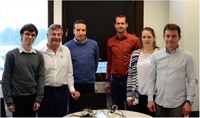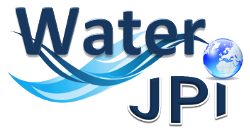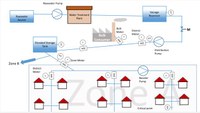IoT.H2O
Project Coordinator
 Dr. Harald Roclawski: roclawsk@mv.uni-kl.de
Dr. Harald Roclawski: roclawsk@mv.uni-kl.de
Institutions: Technische Universität Kaiserslautern
Country: Germany
Abstract:
Water transport and distribution systems must be carefully monitored and operated to avoid water losses, to save energy and to protect the assets of the water utilities against damage. In major water transport and distribution systems this task is performed by centralized SCADA (Supervisory Control and Data Acquisition) systems which receive information from remote sensors and remotely control components like valves and pumps. SCADA systems, however, are technically complex and expensive. For this reason, they are often not achievable for small water utilities which do have to operate their transport lines and distribution networks manually. Recent developments in ICT (Information and Communications Technology) open new paths for technologically advanced, however low-cost solutions for water system monitoring and control. In the first place it is the decentralized IoT (Internet of Things) approach which already gained significant importance in the industrial sector but is still in an embryonal stage considering water utilities. To explore the promising potential of IoT technologies in combination with other innovative ICT the IoT.H2O project sets up an interdisciplinary consortium.The project proposal follows a systematic approach starting with high time resolution measurements in water systems (already based on IoT technology), numerical description and characterization of the water systems, adaptation and development of hydraulic models suitable for near-real-time simulation, development of tools for implementation in IoT nodes for optimizing of component operation (e.g. pump operation / condition monitoring) and for supporting decision making (e.g. energy efficient reservoir management, alarm generation in case of incidents like pipe bursts, urban flashflood etc.), testing and system comparison by use of “water system digital twins” and physical water system models. The overall IoT system will be installed in systems in Belgium, Brazil and Germany for extended field testing and demonstration. Further application in other water utilities will be supported by documentation of the used methodology. The outcome of the project will be a new ICT approach for low-cost water system monitoring and operation. This system will contribute to water loss reduction, backing the efforts against impacts of water scarcity, simpler maintenance strategies and strengthening of water systems resilience against havocs.
Funder of the project:
Federal Ministry of Education and Research (Germany)
Conselho Nacional das Fundacoes Estaduais de Amparo a Pesquisa (Brazil)
Agence Nationale de la Recherche (France)
Fund for Scientific Research (Belgium)
Photo of the Research Team


